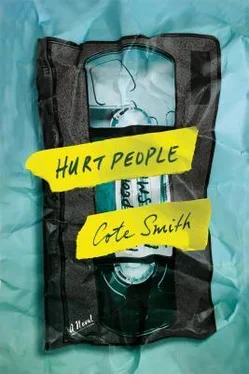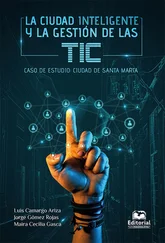What about the smoking lady? I asked him. I had seen her talking to Chris, hadn’t I? Whatever happened to her?
No sign, my dad said. Not since the tornado. We know she has no son listed, but we’re tracking down her relatives. Nothing yet.
When my dad couldn’t look anymore, he would come home. His eyes strained, his body tired and thinned with grief. If he was home at dinnertime, he grilled out. He stood alone on the porch and watched the open flame. He didn’t move when the wind changed and the smoke drifted across his face, already burned from hours spent wading through the woods. The last wave of the summer sun scorched him a sad brown, then a bright red, and each day he dried up and shrank a little. When the food was ready, my dad took a plate down to my mother, knowing she would eat next to nothing, if anything at all. He would murmur a few words to her, and slowly climb the stairs and return to the kitchen, where for the first time since we were all a family, he ate at the table. After the first week I stopped asking if he had found anything, if he’d picked up on any leads or discovered new clues. In those long hours we lingered in the living room, I learned to read my dad’s face too.
* * *
When I was alone, my mind wanted comparisons. It wanted to make sense of the overwhelming emptiness I woke up to every morning, and carried with me through the day. It’s like when Baron died, my mind told me. Remember? How strange and terrible it was to wander room to room and not be followed, to realize you would never hear the soft pant of his spent breath, the jingle of his collar clinking behind you. This is like that, don’t you think? In some way? Doesn’t that make it better?
The truth was it didn’t. The truth was I knew that when I went downstairs each night and climbed into bed, my mother would be crying, and that I would clench my fists and flex my body as tight as I could in the stupid hope that I would not cry too. That will only make your mother sadder, I told myself, and haven’t you done enough? The truth was I had dreams of the lake, only this time I was the one in the boat, and my brother was the one left in the water, with nothing to keep him afloat.
* * *
The city recovered. Or kept moving. So we would have something to talk about besides what we were avoiding, my dad kept up-to-date on the cleanup. Within a week the grocery store reopened. The car the tornado crashed through the front was removed, the windows replaced. Work crews cleared the streets of debris, filled dump trucks to their beds’ rims. What they couldn’t haul away they piled in yards, little hills of wrecked lives.
Still, the tornado wasn’t a big one, according to the newspaper. Not when compared with others that had struck our state the same summer. Unlike those storms, which flattened entire towns off the map, ours had inflicted what the state labeled “manageable damage.” Though many had been injured, though homes had been leveled or made unlivable, there were no known deaths.
“We’ll get past this,” my dad said one evening, his face hidden behind the paper.
I stared at the article on the back page of what he was reading, a blurb about another escape, this time from the women’s prison. From what I could read, the article didn’t mention anything about the Stranger. It was like the world had moved on and everything I cared about was forgiven or forgotten.
“How?” I finally said. How were things going to get better?
“Just give it some time, son. We don’t know if things are the worst.”
He put the paper down and tried to smile at me, then went downstairs to talk to my mother. I followed him to the door and listened to him plead with her. Tell her how he needed her to be strong, to guide me through this while he was gone. Won’t you come upstairs? my dad asked. If not for me, for him?
There was a lull. Until I heard my mother’s voice. Soft, matter-of-fact. I heard her ask my dad if he’d found anything, if he knew who took her boy. When my dad said no, my mother said, Then you have my answer.
* * *
When my dad was gone, I hung out on his front step. There, I could think about whatever I wanted, or I could think about nothing. I could stay or I could go. I could sneak off and hurl a rock at a neighbor’s door or I could be good. I could behave. I could sit and wonder why my brother chose not to, why he snuck out all the time, why he went into the woods with the man we thought was Chris. What was he after? I could ask myself. Where did he want to go?
All this because I couldn’t watch TV anymore. I refused. I couldn’t watch another fake family laugh their way through their fake problems. I couldn’t watch the news and risk seeing a story about my brother. Only once did my dad suggest we go to the video store. No, I told him, but I didn’t give him the reason why. I didn’t tell him that, lately, there was only one tape I’d thought about watching. The one my dad kept upstairs, hidden in his closet. I didn’t tell him that part of me still thought Chris and the Stranger were the same, and that if I could just make myself watch that tape one more time, at least some of my questions might be answered. I didn’t tell him this because I was afraid. Because I couldn’t imagine watching something so horrible again, and this time, without my brother.
* * *
I had forgotten about the smoking lady until my mother started to resemble her. This was the third week without my brother. Three weeks of my dad and me walking around like zombies. We no longer talked to each other. We chewed our food, he read the paper, and at the end of the day we silently nodded good night. A reality was sneaking up on us. A story I never wanted told.
I grew used to the quiet. When my dad was gone during the day and I had no desire to be outside with worthless birds chirping and the mocking sun, I lay on the couch. I crossed my arms like I was in a casket and stared at the ceiling, at nothing. I slept, and when I wasn’t asleep, I thought of the worst things. And if I wasn’t at peace I was at something like it, only sadder. There was the numbness of calm, but it came with a shadow. Lurking over me on the couch, saying, Don’t get too comfortable.
So it was a shock when my mother came out of the basement during the middle of that third week. The middle of the day, even. I must’ve screamed when I saw her standing in the doorway. She startled and put her hand to her heart, wrapped herself tightly in the pink bathrobe she’d been wearing for weeks.
“Is your dad here?”
I shook my head, too mesmerized by her strange appearance to speak. She was new. She was once again transformed, but this time the change was bad. Her big yellow hair was limp, flat, matted to her head with sweat and grease. Purple circles hung under her eyes, puffed out from her bony, pale face. She looked like she was dying, or was already dead. Her hands would not stop fidgeting, a tic she must’ve picked up from the smoking lady.
“Did you have any breakfast?”
“No,” I said. It was well past noon.
She slowly made her way to the kitchen and poured a glass of orange juice. She sat down and drank the glass with one long tilt, wiped her mouth with the back of her arm, and went downstairs, back into the basement. I did not see her the rest of the day.
* * *
One day my mother spent an entire morning upstairs, sipping her orange juice and staring out the back porch window. She didn’t say anything to me and I didn’t say anything to her. When my dad came home from an all-night shift and saw her sitting upstairs, he looked confused, like he came to the wrong home.
My dad sat down with my mom. She didn’t seem to notice him at first, or if she did, she still didn’t look in his direction. The two of them stared out the window, and although I knew neither would allow themselves to feel the smallest bit of happiness, for that fleeting second, the duplex lost a little of its gloom.
Читать дальше












